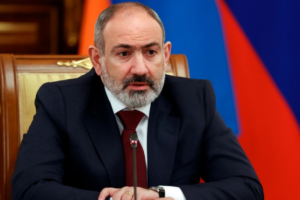The prime minister of Armenia and Georgia, Nikol Pashinyan and Irakli Garibashvili, signed a strategic partnership agreement in Tbilisi on Friday.
The agreement is to promote further cooperation between the neighboring countries in the spheres of economy, diplomacy and security, including the delimitation of borders between the two countries, which Pashinyan said Yerevan and Tbilisi will undertake.
“The economic cooperation between our countries has great potential, and our task is to contribute to its full disclosure and implementation. In this regard, the intergovernmental commission for economic cooperation has an important place in deepening and strengthening the economic ties between the sides,” Pashinyan said during remarks.
“I would like to state with satisfaction that the agenda of the session of the intergovernmental commission is quite inclusive and covers such areas of bilateral cooperation as transport, communication, energy, information technology, healthcare, tourism, agriculture, education and science, culture, environmental protection, etc. I attach importance to the full implementation of the agreements reached within the framework of the session, which will give new quality and substance to the relations between our countries,” added Pashinyan.
“I am happy to report that last year the volume of trade between the two countries exceeded $1 billion. I am sure that this is not the maximum, and in the coming years, the positive dynamics of the trade turnover will be preserved, thanks to the growth of the economies of the two countries and the deepening of interaction,” the Armenian prime minister said.
He also discussed the issue of negotiations between Armenia and Azerbaijan, saying that he hoped that Baku will return to the negotiating table after the scheduled presidential elections in Azerbaijan next month.
Garibashvili said his country supports the peace talks between Yerevan and Baku and offered assistance in advancing the process, saying that such an effort would only increase the region’s security and prospects of peace.
Source: Asbarez





